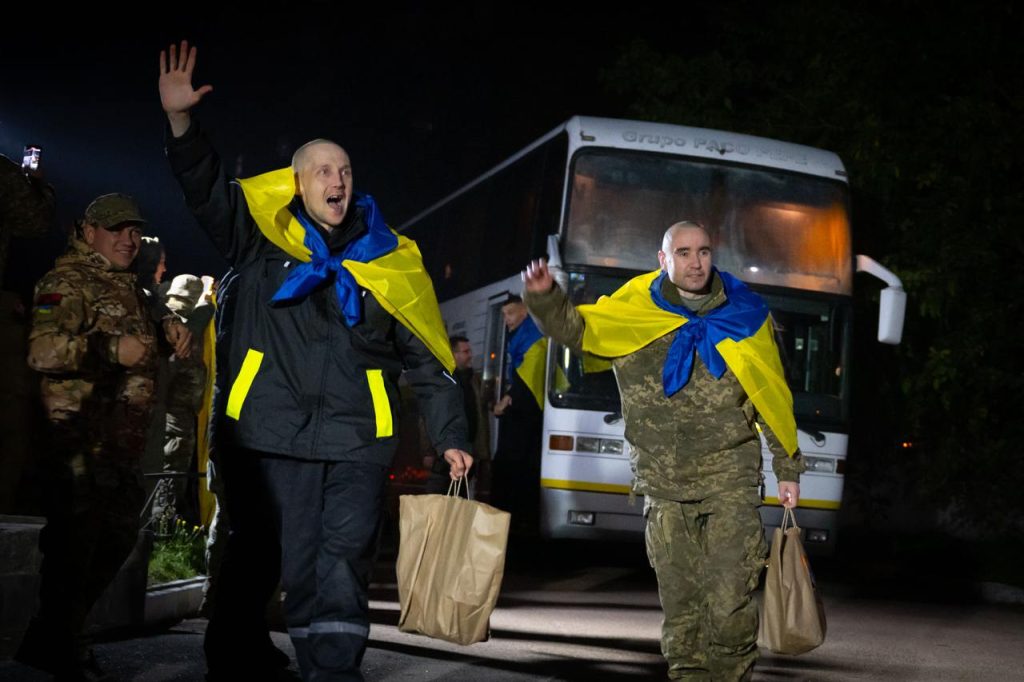In 2024, more Ukrainians were released from Russian captivity compared to the previous year, as reported by the Coordination Headquarters for the Treatment of Prisoners of War (POWs). Ukraine conducted 11 prisoner exchanges and secured the return of 356 more individuals than in 2023, bringing the total number of released individuals since the full-scale invasion to 3,956. President Volodymyr Zelensky emphasized the importance of each person released, stating that they represent a significant individual in Ukraine and each return brings life back to the country. The successful release of 189 captives on December 30, including military personnel and civilians, was described as one of the largest exchanges since the start of the war, with individuals from key frontlines like Azovstal, Mariupol, and Snake Island being freed.
Among those released in the exchanges were members of various military and security forces, including 87 Armed Forces members, 43 National Guard members, 33 border guards, 24 sailors, and fighters from the Azov Regiment. The significance of these releases was highlighted by the difficult conditions endured by many captives in Russian detention, underscoring the importance of the ongoing efforts to secure the release of all individuals held captive. The Coordination Headquarters continues to work towards the release of additional prisoners and to document the experiences of those who have suffered in captivity. The resilience and bravery of those who have survived harrowing conditions in detention centers serve as a reminder of the ongoing humanitarian crisis resulting from the conflict.
One survivor of Russian captivity, Stanislav Aseyev, a Ukrainian writer and journalist, shared his experiences of surviving the Izolyatsia prison in Russia-occupied Donetsk, known for its brutal treatment of prisoners. Aseyev was among the first Ukrainian journalists to witness the Sednaya prison and death camp in Syria following the fall of Bashar al-Assad. His account sheds light on the atrocities committed against prisoners in various detention centers, highlighting the need for continued international attention and action to address human rights abuses in conflict zones. The testimonies of survivors like Aseyev provide important insights into the realities faced by those detained in harsh conditions and serve as a call to action for justice and accountability.
The ongoing prisoner exchanges and efforts to secure the release of individuals held captive in Russia continue to be a priority for Ukraine, with President Zelensky reaffirming the government’s commitment to bringing all Ukrainians home. The exchanges serve as a glimmer of hope amid the devastation of the war, offering families the chance to reunite with their loved ones and providing a sense of closure for those who have endured uncertainty and fear. While progress has been made in securing the release of prisoners, challenges remain in addressing the broader humanitarian crisis and ensuring the safety and well-being of all individuals affected by the conflict. The resilience and determination of Ukrainian citizens, including those who have survived captivity and continue to advocate for justice, inspire hope for a brighter future in the face of adversity.
As efforts to secure the release of prisoners continue, the international community plays a crucial role in supporting Ukraine and advocating for the protection of human rights. The voices of survivors and advocates like Aseyev serve as a reminder of the urgent need for justice and accountability for those who have suffered in detention. The impact of the conflict on individuals and communities resonates far beyond the battlefield, creating a lasting legacy of trauma and loss. By amplifying the stories of survivors and standing in solidarity with those affected by the conflict, the global community can contribute to the healing and reconciliation process and help to pave the way for a more peaceful and just future in Ukraine.


